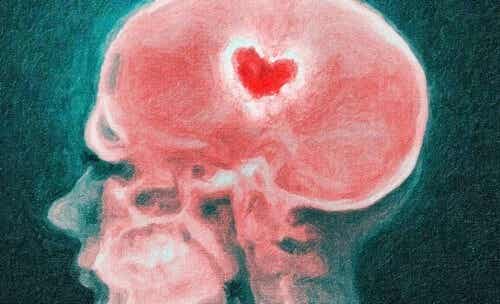
Written and verified by the psychologist GetPersonalGrowth.
Last update: 15 November 2021
During a breakup, the brain experiences profound distress. Not only that, science has shown that it is not the heart that suffers the most, but the brain structures. The brain doesn't know how to process disappointment or abandonment, causing physical pain, fatigue, and lack of energy.
Few facts have inspired man as much as a broken heart. There are an infinity of songs, poems, books. The authors passed on all the pieces of their heart. The leitmotif of all these artistic productions in which we look for a soothing balm for our mood after a couple breakup is precisely "pain".
“How I wish, how I wish you were here. We are just two lost souls swimming in a fish bowl, year after year, we run on the same old ground. "
-Pink Floyd-
The end of a love, betrayals and abandonment generate great pain. We all know this, but there is a curious fact. It is not necessary to get a blow, a scratch or a burn to suffer the physical pain. An affective breakup also generates this symptom. It is the imprint of suffering. It impregnates each of our fibers, our tendons and our joints. Everything hurts, everything is tired. The world darkens and we are trapped by the emotional turmoil that takes place far away from our heart, which, however, we consider guilty.
Genuine suffering is generated by the brain. Let's see how the brain reacts to a breakup.
What science says about the cognitive effects of a couple breakup
To talk about what happens in the brain during a breakup, we have to leave aside the songs, the poetry and the literature. Rather, we need to head to the world of neuroscience. We know that for many, love cannot be analyzed in a laboratory. Nonetheless, however sterile and cold it may seem, it is science that gives the most revealing answers.
In 2011 Edward Smith, a cognitive neuroscientist at Columbia University, conducted a truly amazing series of studies and tests. Thanks to advances in diagnostic and neuroimaging techniques, it has been possible to observe changes in the brain of a person experiencing the end of a relationship.
The brain structures that have a greater synaptic activity are the same ones that are activated when we burn. Pain, as it were, is real to the brain.
Let's dig deeper with some additional data.
The culprits: our neurotransmitters
Why does our suffering seem to have no end at certain moments? Why does it hurt so much to remember? Why does our mind go back so often to that name and to that past history? The answer lies in our neurotransmitters.
- When we end a relationship, the prefrontal cortex "shuts down". Our ability to process information objectively loses functionality.
- In turn, various structures related to attachment and bonds are activated. Hormones such as oxytocin and dopamine, regulated by the limbic system, continue to modulate this need to be close to the other person. This hyperactivity leads us to want to reconnect, to desire a new opportunity. It often obscures us and does not allow us to see what is happening objectively.
A brain in a state of abstinence
For Helen Fisher, a famous anthropologist expert in emotional relationships, love is a system of motivation. It would be an impulse that tries to offer a series of rewards to the brain. These efforts include attachment, intimacy, commitment, sex, the relief of loneliness, etc.
During a break the brain first experiences the loss of this size and panics. The system of rewards, nutrients and security fails. The brain enters a state of abstinence, the same that an addict suffers when a certain cure or a certain substance is withdrawn.
Physical pain is real in a breakup
We talked about it at the beginning, the impact of abandonment or a breakup is experienced in the brain in the same way as physical pain. When someone we love leaves us, it's not long before a torrent of stress hormones such as cortisol and adrenaline are secreted. What does this mean? That emotional distress becomes physical and that these chemicals alter many of our functions.
- When there is an excess of cortisol in the brain, it sends signals to deliver more blood to the muscles. Contractures, tensions, headaches, chest pains, nausea, physical fatigue, etc. appear.
During a breakup, the brain is like a frightened organ. Somehow this concept forces us to abandon the idea that it acts like a computer. Nothing is as subject and orchestrated by emotions as the brain. Every connection, every convolution and profound region of its fascinating structures is alive with feelings. These drives that, in the end, make us human.
The human brain loves love, the loss of this dimension terrifies him and for this he has intense reactions. Nonetheless, he is also adept at regaining his equilibrium. He needs time, calm and new directions, but he adapts. We have the capacity to recover from any adverse event that may occur in our life. When this happens, we come out strengthened.


























